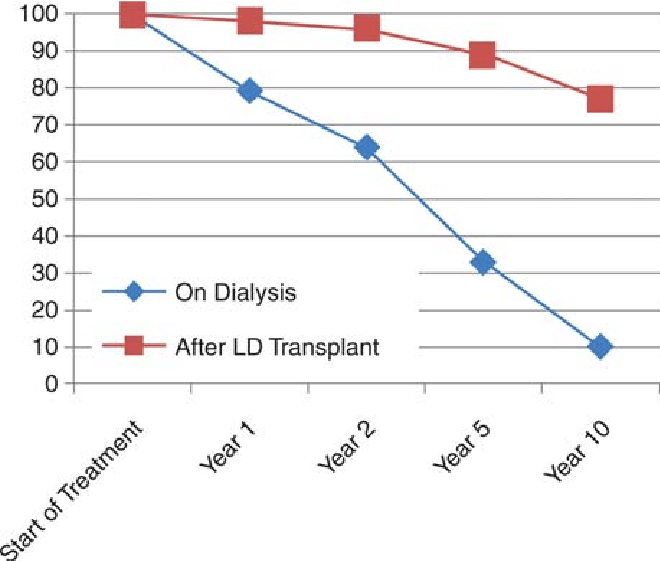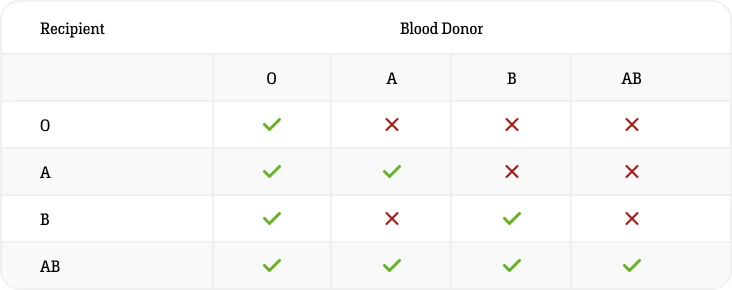
What is Kidney Transplant?
A kidney transplant is the definitive treatment for chronic kidney failure (Chronic Kidney Disease Stage 5), a condition where kidney function is lost permanently and dialysis becomes necessary. While dialysis can sustain life, it only replaces about 10% of normal kidney function. Creatinine never comes to normal, leaving residual toxins in the blood and leading to gradual damage to other organs. Kidney transplantation, on the other hand, restores kidney function by 80-100%, normalizing creatinine levels and all other biochemical, hemodynamic, and metabolic abnormalities. With a transplant, the patient can return to a full, active life, with a much higher survival rate than those relying solely on dialysis.
(See the survival graph of dialysis and transplantation)
Kidney Transplant Procedure
Only one donated kidney is needed to replace the function of both failed kidneys. During the transplant, the new kidney is typically placed in the patient’s groin, with connections made to the patient’s blood vessels and the ureter connected to the bladder. The original diseased kidneys are usually not removed, so the patient will have three kidneys, though only one will be functional.
Kidney transplants can be from live donors (typically 1st or 2nd degree relatives or unrelated altruistic donors) or cadaveric donors (from brain-dead individuals). Blood group compatibility and a negative crossmatch (no antibodies against the donor tissue) are ideal but not absolute requirements for a successful transplant.
(For compatible blood groups click here)
Immunosuppressant medications are essential to prevent rejection of the new kidney. These medications lower the immune response of the recipient and must be taken lifelong. The choice of immunosuppressants depends on the compatibility between the donor and recipient.
Kidney Transplant Cost
The cost of a kidney transplant can vary widely depending on the hospital, location, and the extent of pre- and post-transplant care needed. Although the upfront costs may seem high, a transplant can be more cost-effective in the long run compared to the cumulative costs and reduced quality of life associated with lifelong dialysis.
Kidney Transplant Donor Requirements
A kidney transplant involves the donation of a single kidney from a healthy individual who is expected to live a normal life after donation. Donors must meet specific criteria:
- Age: Donors should be over 18 and preferably under 60-65 years.
- Health: Donors must have no conditions that could affect kidney function over time, such as recurrent kidney stones, cardiac issues, or cancer.
- Compatibility: Ideally, the donor should be a 1st-degree relative (parent, sibling, child, or spouse) or a 2nd-degree relative (uncle, aunt, cousin, in-law) with proven tissue compatibility.
Potential donors undergo thorough medical evaluation and counseling to ensure suitability and understanding of the donation process. After donation, the remaining kidney’s function remains stable, due to the kidneys’ reserve capacity, allowing the donor to live a normal, active life.
Kidney Transplant Success and Considerations
Kidney transplantation is a life-saving medical breakthrough that offers patients with end-stage kidney disease a high success rate of 95-98% in the modern era. For patients eligible for transplantation, it provides a much better quality of life and long-term survival compared to dialysis, which has a high failure rate and lacks the regenerative potential of a transplant. For those unable to receive a transplant, dialysis remains a life-sustaining, though challenging, alternative.
Types of Kidney Transplant
Understanding the different types of kidney transplants is essential for patients considering this life-saving procedure:
- Live Related Kidney Transplantation: Involves a living donor who is a blood relative or has a close familial relationship with the recipient.
- ABO Incompatible Kidney Transplantation: Allows transplantation between donors and recipients with incompatible blood types.
- Cadaver Kidney Transplantation: Uses kidneys from deceased donors, often from individuals declared brain-dead.
- Cross-Match Positive Kidney Transplantation: Matches donors and recipients even with a positive cross-match, though it may carry a higher risk.
- Swapping (Exchange) Kidney Transplantation: Involves paired donors and recipients who exchange kidneys with another pair to achieve better compatibility.
Kidney Transplantation in India
If you're considering a kidney transplant due to chronic kidney disease or end-stage renal failure, expert guidance is crucial for a successful outcome. Dr. Kamal Kiran specializes in kidney transplantation, offering tailored treatment plans that focus on achieving the best possible results. Offering a high success rate and tailored care, Dr. Kamal Kiran provides comprehensive support throughout the kidney transplant process, from donor matching to post-surgery recovery. Take control of your kidney health and explore the life-changing benefits of a renal transplant. Schedule your consultation today and embark on the path to a healthier, dialysis-free life.

